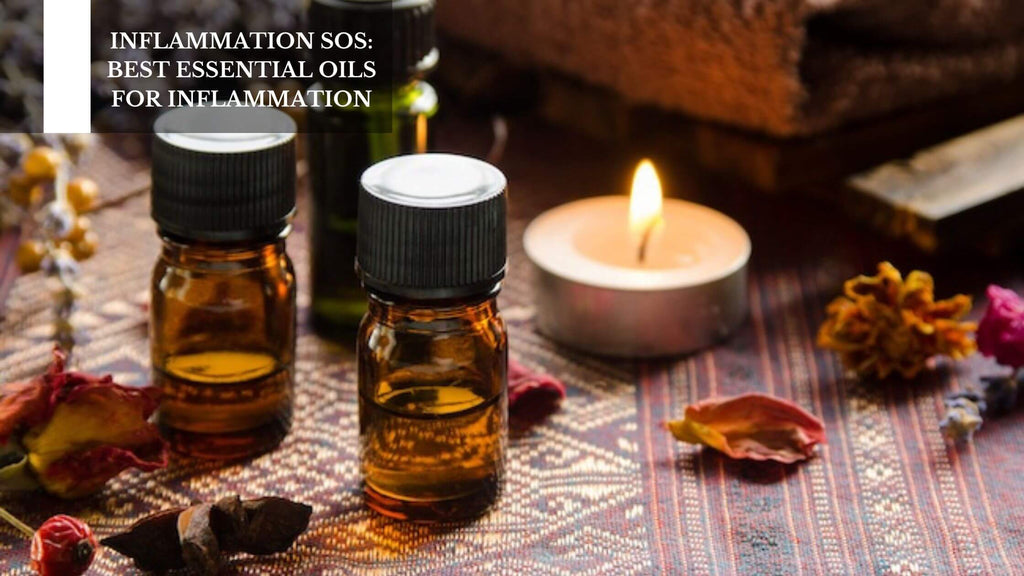Inflammation SOS: Best Essential Oils For Inflammation

Inflammation is a common problem that can affect people of all ages. It can be caused by a wide range of factors, including poor diet, stress, lack of sleep, and environmental factors. Fortunately, nature has provided us with a powerful arsenal of essential oils that can help soothe inflammation and reduce pain. Essential Oils are derived from various parts of plants, including leaves, flowers, and roots. They have been used for centuries to treat a wide range of health conditions, including inflammation. In this blog post, we will explore the top essential oils that can help soothe inflammation, their benefits, and how to use them effectively.
You may also like:
Whether you are suffering from arthritis, joint pain, or any other type of inflammation, this guide will help you find the right essential oil to help you feel better. The healing properties of essential oils are attributed to their bioactive components, including terpenes, phenols, and aldehydes. These compounds possess anti-inflammatory, analgesic, and antioxidant properties, making them effective in reducing inflammation and promoting overall well-being. Essential oils can be used topically, aromatically, or internally, depending on the specific oil and its recommended usage. When applied topically, they can be diluted with carrier oils to ensure safe and effective application. Through inhalation, essential oils can be diffused or inhaled directly, allowing their aromatic molecules to enter the body and provide therapeutic benefits.
Best essential oils for inflammation relief
1) Lavender essential oil
When it comes to soothing inflammation, lavender essential oil works wonders. It contains compounds such as linalool and linalyl acetate, which have been scientifically proven to possess potent anti-inflammatory effects. These compounds work by inhibiting the production of pro-inflammatory enzymes and cytokines, effectively reducing inflammation at its source. Whether you're dealing with skin irritations, muscle soreness, or even internal inflammation, lavender essential oil can provide much-needed relief. When applied topically, it can help soothe and heal inflamed skin conditions such as eczema, psoriasis, and sunburn. Its gentle yet effective nature makes it suitable for all skin types, including sensitive skin.
2) Tea tree essential oil
Tea tree essential oil, derived from the leaves of the Melaleuca alternifolia tree, has gained immense popularity in the world of natural remedies due to its remarkable healing properties. Renowned for its potent antimicrobial and anti-inflammatory effects, tea tree essential oil has become a staple in many households as a go-to solution for a variety of ailments. One of the key benefits of tea tree oil is its ability to combat inflammation. Inflammation is the body's natural response to injury or infection, but when it becomes chronic, it can lead to a host of health issues. By harnessing the power of tea tree essential oil, individuals can seek relief from inflammatory conditions, such as acne, eczema, and psoriasis.
3) Eucalyptus essential oil
Eucalyptus essential oil can also be applied topically to soothe inflammation and reduce pain. It is commonly used in massage oils or diluted in carrier oils to relieve muscle aches and joint pain caused by conditions like arthritis or sprains. To harness the healing power of eucalyptus oil, it is important to use it safely and effectively. It is recommended to dilute the oil before applying it to the skin and perform a patch test to check for any potential allergic reactions. Inhalation can be done by adding a few drops of the oil to a diffuser or a bowl of hot water for steam inhalation.
4) Peppermint essential oil
The anti-inflammatory properties of peppermint essential oil help to reduce redness, swelling, and discomfort associated with inflammation. It can be particularly beneficial for individuals suffering from conditions such as arthritis, muscle strains, or sports injuries. When applied to the affected area, peppermint oil quickly penetrates the skin and works its magic. The cooling effect helps to numb the area, providing immediate relief from pain. Additionally, the anti-inflammatory properties work to reduce the underlying inflammation, further alleviating discomfort.
5) Frankincense essential oil
Frankincense essential oil is renowned for its ability to promote cellular regeneration, making it an excellent choice for reducing inflammation and supporting the body's natural healing process. It contains compounds known as boswellic acids, which have been shown to inhibit the production of inflammatory molecules in the body. When applied topically, frankincense essential oil can penetrate deep into the skin, targeting inflamed tissues and providing relief. It has a soothing effect on the skin, helping to calm redness, swelling, and irritation.
6) Chamomile essential oil
Chamomile essential oil, derived from the flowers of the chamomile plant, has long been celebrated for its soothing properties. This versatile essential oil is not only known for its ability to calm and relax the mind but also for its remarkable ability to soothe skin inflammation. When applied topically, chamomile oil can help alleviate redness, irritation, and itchiness caused by various skin conditions such as eczema, psoriasis, and dermatitis. Its anti-inflammatory properties work to reduce swelling and promote healing, making it an excellent natural remedy for those struggling with inflamed skin.
7) Rosemary essential oil
One of the primary benefits of rosemary oil is its anti-inflammatory properties. It contains compounds such as rosmarinic acid, which has been found to possess potent anti-inflammatory effects. These properties make rosemary oil a valuable tool in managing various inflammatory conditions. For individuals dealing with joint pain or muscle soreness, rosemary essential oil can be applied topically to the affected area. Its anti-inflammatory properties help to reduce swelling and alleviate discomfort, providing much-needed relief. Additionally, rosemary oil can be used in massage blends to target specific areas of inflammation and promote relaxation.
Precautions before the use of essential oils for inflammation

1. Dilution is key: Essential oils are highly concentrated and should always be diluted before use. Mixing them with carrier oils such as coconut oil, jojoba oil, or almond oil helps to reduce the risk of skin irritation. A safe dilution ratio is generally 2-3 drops of essential oil per teaspoon of carrier oil.
2. Patch test before use: Before applying any essential oil topically, it is crucial to perform a patch test. Apply a small amount of diluted oil on a small area of your skin and observe for any adverse reactions. If there is no irritation or discomfort after 24 hours, it is likely safe to use.
You may also like:
3. Choose the right oil: Not all essential oils are suitable for inflammation relief. Some of the top oils known for their anti-inflammatory properties include lavender, peppermint, eucalyptus, frankincense, and chamomile. Research and select oils that align with your specific needs and preferences.
FAQs
1. Can inflammation be a chronic disease?
Chronic inflammation has been linked to a range of conditions, including arthritis, cardiovascular diseases, allergies, and even certain types of cancer. It can also contribute to the development of autoimmune disorders, where the immune system mistakenly attacks healthy cells.
2. Can these essential oils be used for sensitive skin?
It is important to note that essential oils should be used with caution and diluted properly before use, as they are highly concentrated substances. It is always advisable to consult with a qualified aromatherapist or healthcare professional before incorporating essential oils into your wellness routine, especially if you have any underlying health conditions or are taking medications.


Leave a comment